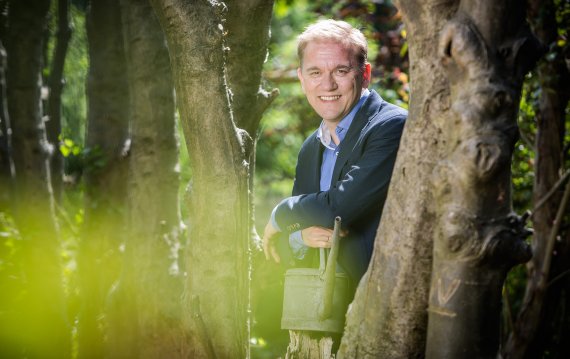photo Freek van der Bergh. Eppo Bruins of the Christian Union party wonders whether there can ever be an end to the battle of ideologies between intensive and ecological agriculture.
For many years now, Ken Giller has been working on boosting agricultural production in Africa. The professor of Plant Production Systems in Wageningen aims to apply ecological principles in agriculture. ‘I started with nitrogen fixing, the best organic resource we have. I aim for tailor-made approaches adapted to local ecological conditions. But in practice, I noticed that we do also need small quantities of artificial fertilizer in African farming. But if I mention “artificial fertilizer” I must be in bed with Monsanto, according to some supporters of organic farming.’
Soul to the devil
Our food production has become an ideological battleground for advocates of mainstream, highly productive agriculture on the one hand and of ecological, circular farming on the other. Both groups work with organic processes, but take a different approach. The mainstream school works on ‘ecological intensification’ – using natural resources such as land, water and phosphorus as efficiently as possible. The alternative school works on ‘agro-ecology’, aiming to make optimal use of natural processes and functions.
Giller has made up his mind. ‘I do not go for a purely organic approach. I want to make agriculture more efficient by bringing in ecological principles.’ The knowledge about soil management available in ecological farming circles is particularly useful here, says Giller. He embraces the German school of agro-ecology. ‘The approach at the university of Hohenheim is to use ecological principles to improve sustainable agriculture. You adapt farming methods to environmental conditions.’
He has less sympathy with the political Latin-American school of agro-ecology. ‘The ecological movement embraces small-scale self-sufficient farmers, but they cannot feed the expanding African cities.’ It also annoys Giller that if he collaborates with ‘the Unilevers of this world’ to improve the food supply, the ecological crowd immediately accuse him of selling his soul to the devil.
No dialogue
This demonstrates that for the agro-ecologists, food production is not just an ecological issue but a social one. ‘The agro-ecological approach focuses on the distribution of food and opposes the powerful agro-industry which dominates the whole production chain for our food,’ says Felix Bianchi, a researcher in the Farming Systems Ecology chair group in Wageningen. ‘These multinationals produce the inputs as well as processing and selling the products. That’s part of why we want agriculture that is less dependent on external inputs such as diesel, pesticides and artificial fertilizer. More and more power is in the hands of a few companies, and that invokes increasing resistance, because these agribusinesses are out to deal in food just for the money without sufficient concern about ecological and cultural values. That is why agro-ecologists strive for food sovereignty, independence from the food giants, and an alternative food system.’
If I mention “artificial fertilizer” I must be in bed with Monsanto
For this reason, Bianchi sees no future in dialogue to bring the two movements together. ‘I think that’s a typical Dutch polder idea. Look at the balance of power between the agro-industry and the alternatives. If we start a dialogue and cooperate with the agro-industry, I know who’ll come out of it better. You are better off putting up opposition to tip the balance in our direction. I don’t think the solution lies in compromise; I think you need several different models to ensure varied food production.’
In short, there are political reasons for keeping up the controversy between mainstream and ecological partisans. So the proponents of intensive agriculture keep on saying organic farming cannot feed the world, while the champions of agro-ecology unite around their rejection of ‘the Monsantos’ of the world.
Cycles
But there are researchers who attempt to bring the two schools together intellectually. One such researcher is Hannah van Zanten of the Animal Productions Systems chair group. Her supervisor, professor Imke de Boer, is wildly enthusiastic about the study with which Van Zanten is due to get her PhD soon. She applied the thinking of both the intensification and the circular agriculture in the livestock sector.
‘The sustainable intensification camp aims at the highest possible animal production per hectare,’ explains De Boer. ‘With that approach you can easily grow cereals to use as livestock feeds. The agro-ecological camp says: no, you mustn’t feed grain to animals, you should eat it yourself. You should feed animals on waste products and biomass that we can’t do anything else with. By agro-ecological standards, pork or eggs only pass muster if the feed is sourced from waste, and the production of milk or meat scores better, especially if it’s produced on grassland that is less suitable for arable farming. In fact, agro-ecology does not aim for the highest possible animal productivity per hectare, but for feeding as many people as possible per hectare, under the particular ecological conditions.’
In order to bring these approaches closer together, you need to think in terms of cycles, adds De Boer. ‘How much biomass is in circulation in this cycle, and which part of it is suited to humans and which to animals? In other words: how can we get the most out of the available biomass? In this approach, fertilizer and food waste are not just garbage but resources in the cycle.’
This new systems thinking does have political implications, De Boer realizes. ‘If we in Europe carry on eating as much animal protein as we do at the moment, we will have to go on producing chicken and eggs through intensive farming. But that is not the best way to use your biomass. From the biomass perspective you’ve got to use less grain as feed and cut down the consumption of animal protein.’
Question time for Resource

They are used to posing their questions to the cabinet, but in this series Dutch parliamentarians also get to ask Resource a question for Wageningen scientists to answer. In this edition, Eppo Bruins of the Christian Union party wants to know why the debate is so heated between the advocates of intensive agriculture ‘more crop per drop’- and of ecological agriculture. How can we bring these schools of thought closer together?

